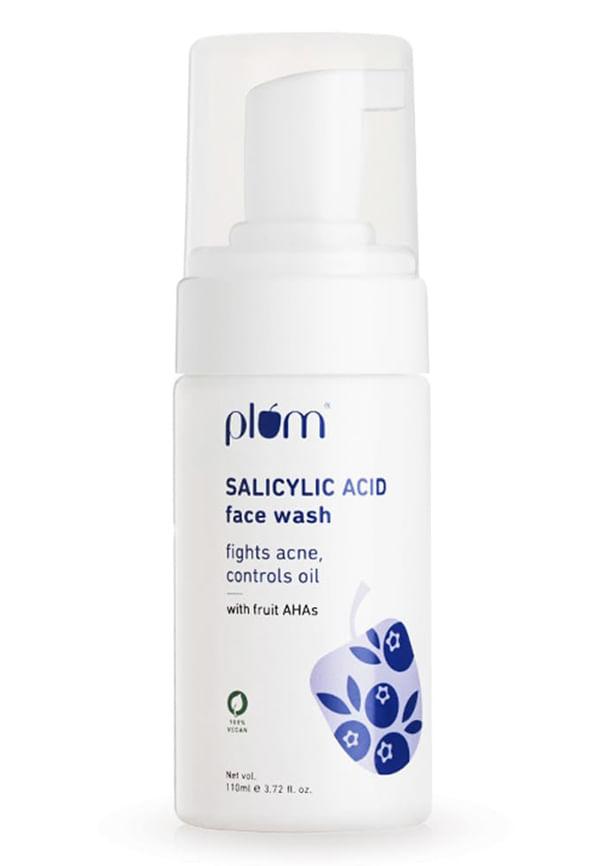How to Use Salicylic Acid for Clearer Skin


Salicylic acid might just be the game-changer your skin's been waiting for. This powerhouse ingredient has been quietly revolutionising skincare routines across the globe, and for good reason. Whether you're dealing with stubborn breakouts, clogged pores, or just want smoother skin texture, learning how to use salicylic acid on face properly can transform your complexion. But here's the thing—like any potent skincare ingredient, it's all about technique, timing, and finding what works for your unique skin. Let's dive into everything you need to know about incorporating this beta hydroxy acid into your routine safely and effectively.
Salicylic acid is a beta hydroxy acid (BHA) that works differently from your typical surface-level treatments. Unlike alpha hydroxy acids that work on the skin's surface, this oil-soluble wonder can penetrate deep into your pores, making it incredibly effective for tackling issues from within.
The magic of salicylic acid benefits lies in its unique molecular structure. Being oil-soluble means it can cut through sebum and dead skin cells that clog your pores. It gently dissolves the bonds holding dead skin cells together, promoting natural exfoliation without the harsh scrubbing that can irritate your skin.
What makes it particularly brilliant is its anti-inflammatory properties. This means it's not just clearing out your pores—it's also calming existing irritation and reducing redness.
The versatility of salicylic acid uses extends far beyond basic acne treatment:
Acne and blackhead treatment: Penetrates pores to dissolve clogs and prevent new breakouts
Pore size reduction: Regular use helps keep pores clear, making them appear smaller
Skin texture improvement: Gentle exfoliation reveals smoother, more refined skin
Sebum regulation: Helps balance oil production without over-drying
Getting the application right is crucial for seeing results without irritation. The key is starting slowly and building up your skin's tolerance gradually.
Before you start using any salicylic acid product, patch testing is non-negotiable. Apply a small amount to your inner forearm and wait 24-48 hours to check for any adverse reactions. Your skin should be completely clean and dry before application—any residual products can interfere with absorption.
Timing matters too. If you're new to salicylic acid treatment, evening application is usually best since your skin can be more sensitive to sunlight after use.
 100 ml
100 mlSalicylic Acid Face Wash
 150 ml
150 mlSalicylic Acid Daily Gentle Cleanser
The method for how to apply salicylic acid varies depending on the product type you're using:
Salicylic Acid Cleanser: Massage gently onto damp skin for 30-60 seconds, focusing on areas prone to congestion. Rinse thoroughly with lukewarm water. This is the gentlest way to introduce salicylic acid into your routine.
Salicylic Acid Serum: Apply 2-3 drops to clean, dry skin. Gently pat and spread evenly, avoiding the delicate eye area. Allow 1-2 minutes for complete absorption before applying other products.
Always avoid the immediate eye area and any broken or severely irritated skin. Start with targeted application on problem areas before progressing to full-face use.
After applying salicylic acid, your skin needs proper support. Follow up with a gentle, hydrating moisturiser to prevent dryness. During the day, sunscreen with at least SPF 30 is absolutely essential—salicylic acid can increase your skin's photosensitivity.
Not all salicylic acid products are created equal, and choosing the right formulation can make all the difference in your results and comfort level.
A salicylic acid cleanser offers a gentler introduction to the ingredient since it's rinsed off after use. This makes it perfect for sensitive skin or beginners. The concentration in cleansers typically ranges from 0.5-2%, providing effective exfoliation without overwhelming your skin.
A salicylic acid serum, on the other hand, stays on your skin longer, allowing for deeper penetration and more intensive treatment. These leave-on formulations are ideal once your skin has built tolerance and you're ready for more targeted results.
Finding the right concentration is crucial for effective yet comfortable use:
Sensitive skin: Start with 0.5-1% concentration, used 2-3 times per week
Normal/combination skin: 1-1.5% concentration works well for most people
Oily/acne-prone skin: Can typically handle 1.5-2% concentration with proper introduction
 200 ml
200 mlSalicylic Acid Face Wash with Glycolic Acid, Niacinamide & Licorice Extracts
 100 ml
100 ml2% Salicylic Acid Face Wash For Oily Skin
Salicylic acid for acne is one of the most researched and effective treatments available. Its ability to penetrate pores and reduce inflammation makes it particularly effective for both treating existing breakouts and preventing new ones.
For active breakouts, you can use salicylic acid as a targeted spot treatment. Apply a small amount directly to the affected area after cleansing but before moisturising. This concentrated approach can help reduce inflammation and speed healing without affecting your entire face.
Results typically become noticeable within 2-6 weeks of consistent use, though some people see improvements sooner.
For blackheads, salicylic acid works by dissolving the keratin plugs that form in your pores. Regular use helps prevent new blackheads from forming while gradually clearing existing ones. The key is consistency—sporadic use won't give you the results you're looking for.
Many people find that using salicylic acid at night works best for their skin. Your skin naturally repairs itself while you sleep, and avoiding immediate sun exposure can reduce the risk of irritation. Plus, you won't have to worry about layering sunscreen immediately after application.
Salicylic acid exfoliation is gentler than physical scrubs but still requires a thoughtful approach to frequency and application.
Begin with 2-3 applications per week for the first 1-2 weeks. This gives your skin time to adjust without overwhelming it. Pay attention to how your skin responds—some initial dryness or mild irritation is normal, but severe reactions mean you should slow down or stop use.
Gradually increase frequency based on your skin's tolerance. Some people can eventually use salicylic acid daily, while others find every other day works better.
Once your skin is accustomed to salicylic acid, you can consider daily use if your skin tolerates it well. However, some people benefit from cycling on and off periods, especially during seasonal changes when skin sensitivity might fluctuate.
 100 ml
100 mlSalicylic Acid Oil Control Facewash- 0.5% Salicylic Acid + 1% Niacinamide
 110 ml
110 mlSalicylic Acid Foaming | With Encapsulated Salicylic Acid & Fruit AHAs Face Wash
Understanding potential salicylic acid side effects helps you use the ingredient safely and know when to adjust your routine.
Initial purging is completely normal and usually lasts 2-4 weeks. This happens because salicylic acid accelerates cell turnover, bringing underlying congestion to the surface faster. Mild dryness, slight redness, or increased sensitivity are also common when starting.
To manage these effects, ensure you're using a good moisturiser and reduce frequency if irritation persists beyond the initial adjustment period.
Pregnant and breastfeeding individuals should consult their healthcare provider before using salicylic acid products. If you have compromised skin barrier function or are using prescription acne medications, professional guidance is recommended.
Avoid using salicylic acid simultaneously with retinol—alternate days or use one in the morning and one at night. It generally plays well with niacinamide and hyaluronic acid, but always introduce new combinations gradually.
Getting the most from your salicylic acid for skin routine requires more than just application—it's about creating a supportive environment for your skin to thrive.
Consider your overall routine when incorporating salicylic acid. Morning use requires diligent sunscreen application, while evening use allows for overnight repair. Complementary ingredients like niacinamide can help reduce irritation, while hyaluronic acid provides essential hydration.
Seasonal adjustments might be necessary—your skin may be more sensitive in winter or require different frequencies during humid summer months.
 30 ml
30 mlAHA BHA Exfoliating Serum||Salicylic Acid & Glycolic Acid
 15 ml
15 mlAcne Spot Corrector with Salicylic Acid & Azealic Acid
If you experience over-exfoliation (excessive dryness, irritation, or sensitivity), take a break and focus on gentle, hydrating products until your skin barrier recovers. If results plateau after several months, consider cycling off for a few weeks or adjusting your concentration.
This is where platforms like Smytten become invaluable for skincare enthusiasts. As India's largest product discovery platform, Smytten connects you with over 1,500 trusted brands including skincare favourites like Cetaphil and Dot & Key. Instead of committing to full-size products that might not work for your skin, you can try curated trial packs to find your perfect salicylic acid formulation. With trial minis available for just ₹249 and 100% cashback redeemable for future purchases, you can experiment with different concentrations and formulations risk-free.
Once your skin has adjusted (typically after 2-4 weeks of gradual introduction), daily use is generally safe for most skin types. However, always listen to your skin and reduce frequency if you experience persistent irritation.
Most people notice initial improvements within 2-4 weeks, with more significant results becoming apparent after 6-8 weeks of consistent use. Patience is key—good skincare takes time.
Yes, but timing matters. Use vitamin C in the morning and salicylic acid in the evening, or space them apart by several hours if using both during the day.
Yes, but start with a lower concentration (0.5%) and use it only 2-3 times per week initially. Always patch test first and discontinue if irritation persists beyond the initial adjustment period.
Purging is normal and typically lasts 2-4 weeks. Continue with your routine but ensure you're moisturising well and using sunscreen. If purging extends beyond 6 weeks or is severe, consult a dermatologist.
Learning how to use salicylic acid on face effectively is a journey that requires patience, consistency, and attention to your skin's unique needs. This powerful BHA can truly transform your complexion when used correctly, helping you achieve clearer, smoother, and healthier-looking skin.
Remember that everyone's skin is different, and what works for others might need adjustment for you. Start slowly, listen to your skin, and don't be afraid to modify your approach as needed. The key to success with salicylic acid lies in finding the right product, concentration, and frequency that works for your individual skin type and concerns.
With Smytten's extensive range of trial-sized skincare products from trusted brands, you can explore different salicylic acid formulations without the commitment of full-size purchases. After all, why settle for maybe when you can try it all and find exactly what your skin loves?